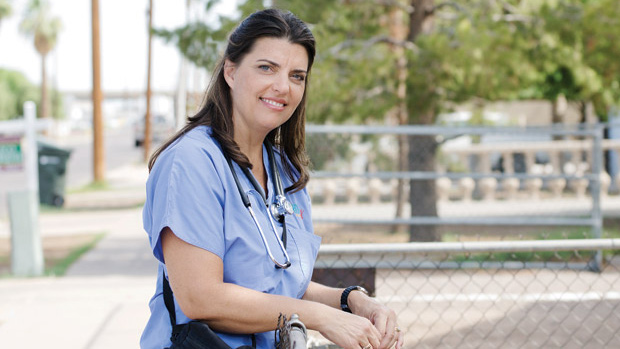When Diego (not his real name) was a little boy in Mexico, his abusive father plunged a fireplace poker into the 3-year-old's left eye. Diego and his mother fled to the United States, ending up in Phoenix.
But Diego's misery continued. Essentially blind, haunted by memories of his father, and mocked by fellow students, he was suicidal by age 10. His mom was undocumented, with no insurance or access to services.
That's when Charlotte Thrall heard about their plight. A nurse who uses her skills to serve Phoenix's uninsured and undocumented, Thrall connected Diego to an ophthalmologist for his eye and a psychiatrist for his anguish. The former crafted a custom contact lens that restored some of Diego's sight. The latter put him on an antidepressant that may have saved the boy's life. All this for free. Today, Diego is a thriving 16-year-old who enjoys playing soccer. If it weren't for Thrall, he might have ended up as another lost statistic.
Newly armed with a DNP (Doctor of Nursing Practice), Thrall regularly works outside a system that often ignores those she aims to serve—mostly undocumented Latinos afraid to seek medical help, lest they be found out. She's always "on call," driving where needed to treat a sick child, to help an adult understand how to manage diabetes, to educate a family about their health care options.
"I want to protect the people who are extremely vulnerable," says Thrall. She earned her doctorate so she could treat more patients herself. "The political climate here has been so difficult and frightening that even to be outside their homes, they feel exposed. They'd wait until they were so sick that they had to go to the ER."
Thrall, 47, founded the nonprofit Community Health Outreach (CHO) in 2005. Since then, she's served as its director and sole staffer—unpaid. She has no office, just a cell phone and a Chevy Tahoe filled with medical supplies and a bag of what she calls "the basics"—a stethoscope, a temp probe, blood glucose testing supplies, an otoscope—and a New Testament.
"It simply makes sense as a health-care provider who is a believer that I try to care for their physical needs, while offering spiritual care as an integrated part of the interaction," says Thrall. "I always offer to pray with the patient at some point in the visit; not one person has declined."
That care given daily on Thrall's rounds is magnified annually at HopeFest, a one-day event at Chase Field, where agencies and individuals provide free groceries, clothing, haircuts, health care, and countless other services. Thrall coordinated the health care component at this year's HopeFest (which drew an estimated 10,000), rounding up Christian and non-Christian providers—over 500 volunteers from some 60 agencies—who gave 275 dental exams, 170 physicals, 80 eye exams, and 20 HIV/AIDS screenings at no charge. Thrall also helped people get connected to ongoing health care, especially diabetics, who make up about one-third of the 50-and-over adult Latino population in Phoenix.
"Charlotte has a visible, contagious passion for Latinos in Phoenix," says social worker Allison Williams. "They respond to her compassion as she gets to know them and their struggles, whether physical, mental, emotional, or spiritual. With her desire for education, health promotion, disease prevention, and her Christ-centered background, this community benefits by desiring a Savior, which then spreads into families and younger generations." (Indeed, Diego's mother became a Christian partly through Thrall's compassion. Another patient, a diabetic, prayed to receive Christ with Thrall one Tuesday morning—and returned every week for both a check-up and prayer.)
Thrall estimates she has served about 2,000 people in seven years, most of them undocumented. But that doesn't faze her—even when lawmakers tried to pass a bill in 2011 that would require EMTS and hospital staff to check patients' legal status before providing medical help.
"There's no mandate that I have to ask for someone's citizenship before they're served," she says. "We are so fortunate in that we don't have to guess where God wants to use us. Our patients show up every day."









